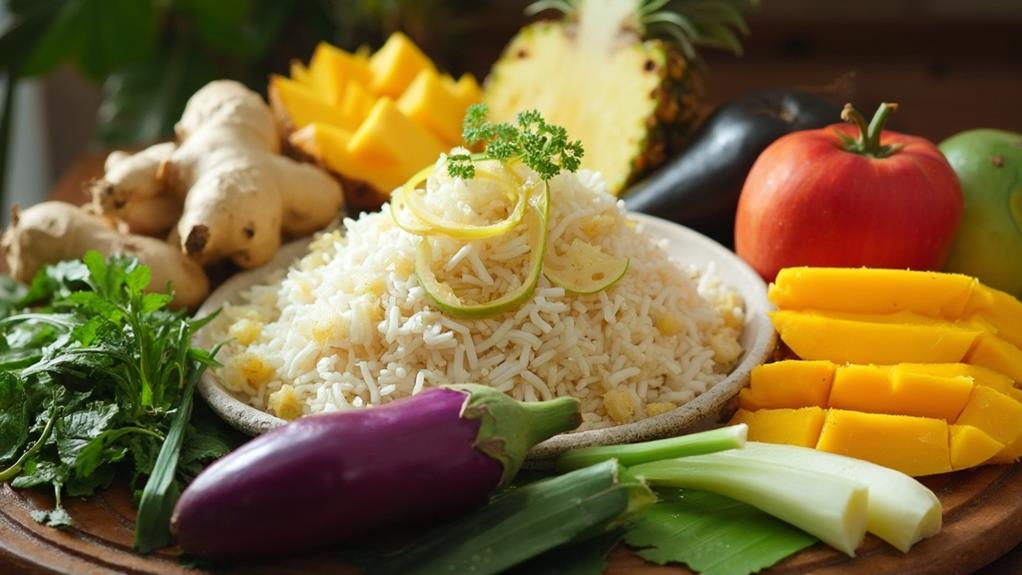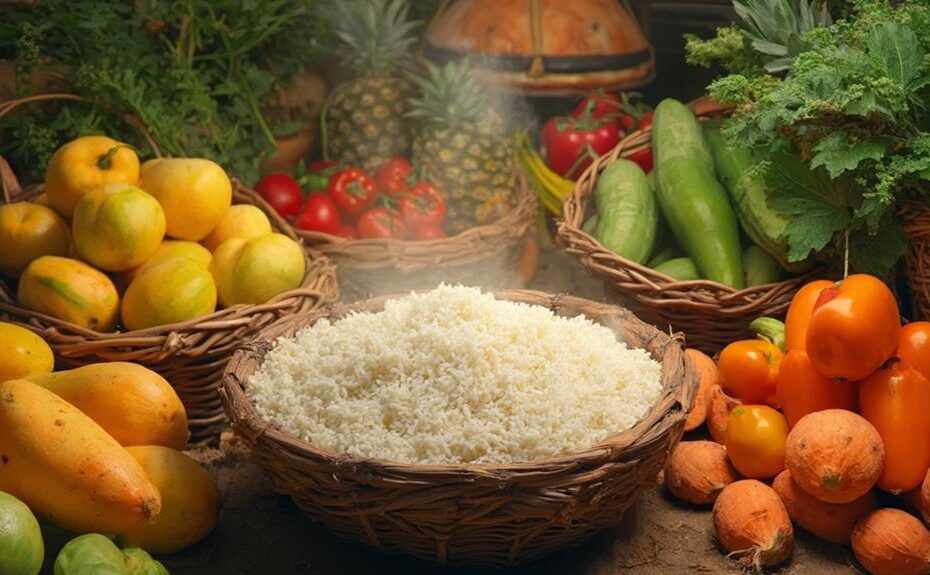Filipino Ingredients: A Nutritional Powerhouse
Incorporating Filipino staples like rice, vegetables, and fruits into your diet can significantly boost your energy and overall health.
Rice: A Staple with a Caveat
Rice provides energy, but it is low in vitamins and minerals. To make it a healthier option, choose brown rice, which is richer in fiber and nutrients.
Vegetables: Rich in Vitamins and Minerals
Vegetables are packed with vitamins and minerals that offer antioxidant properties, helping to prevent chronic diseases.
Fruits: A Delicious Source of Vitamins A and C
Filipino fruits like mangoes and lanzones are rich in vitamins A and C, enhancing overall health.
Other Nutritious Ingredients
Ingredients like malunggay, ginger, turmeric, and garlic offer various health benefits, including reducing inflammation and improving heart health.
Nutritional Value of Rice
Nutritional Value of Rice
Rice is a low-nutrient food that should be consumed in moderation as part of a balanced diet. Rice, a staple in many cuisines, provides a mix of nutrients but lacks essential vitamins and minerals.
White rice, the most commonly consumed type, is high in carbohydrates but low in fiber and many B vitamins and minerals.
Rice can be a good source of certain minerals. It provides some manganese and selenium, which are important for enzyme function and antioxidant defenses.
Choosing the right type of rice can make a difference. Brown rice and other varieties that retain the nutrient-rich bran and germ layers are higher in fiber, magnesium, and various B vitamins, making them a more nutritious option.
Jasmine rice, although popular, is still a refined carbohydrate source.
To balance your diet, pair rice with other nutrient-dense foods. Combining rice with vegetables, fruits, and lean proteins ensures a well-rounded mix of vitamins and minerals.
Incorporating rice into your meals can be part of a balanced diet, but it's crucial to be mindful of portion sizes and combine it with other nutrient-rich foods to maximize nutritional benefits.
Health Benefits of Malunggay
Malunggay, also known as moringa, is a nutritional powerhouse that offers numerous health benefits. This leafy vegetable is rich in antioxidants, vitamins, and minerals, making it a valuable addition to your diet.
Malunggay is an excellent source of essential nutrients. It contains vitamins A, C, and E, as well as calcium, iron, and potassium, which are crucial for maintaining healthy vision, immunity, and overall bodily functions. These nutrients work together to provide a range of health benefits.
Malunggay's antioxidant properties protect cells from damage. They reduce the risk of heart diseases, cancer, and other illnesses by shielding cells from free radical damage.
Its anti-inflammatory effects also inhibit inflammation, lowering the risk of related conditions such as heart disease.
Malunggay helps regulate blood sugar levels. Compounds like chlorogenic acid in malunggay make it beneficial for people with diabetes.
Malunggay supports liver health. It increases protein levels and restores liver enzymes, making it a valuable addition to a healthy diet.
Malunggay is versatile and can be added to various dishes, including soups, stews, salads, or even made into a healthy tea.
Antioxidant Properties of Vegetables

Vegetables are rich in antioxidants, which help protect cells from damage caused by free radicals.
Incorporating a variety of vegetables into your diet boosts your intake of these protective compounds. Broccoli, spinach, carrots, and potatoes are particularly high in antioxidants. These vegetables contain various antioxidant types, such as beta-carotene in carrots and spinach, lutein in spinach and corn, and anthocyanins in eggplant and red cabbage.
Specific vegetables have been linked to reduced risks of certain diseases. For example, broccoli and cabbage are rich in indoles, which have been linked to reduced risks of certain cancers.
Similarly, the antioxidants in sweet potatoes and carrots help protect against oxidative stress, contributing to overall health and well-being.
Making vegetables a staple in your diet can significantly enhance your antioxidant intake and reduce the risk of chronic diseases. By incorporating these vegetables into your meals, you're taking a proactive step in maintaining your health.
Vitamin-Rich Filipino Fruits
Vitamin-Rich Filipino Fruits
Filipino cuisine offers a diverse range of fruits that aren't only delicious but also packed with essential vitamins and minerals. These fruits can significantly enhance your nutritional intake.
Mangoes
Mangoes are the national fruit of the Philippines and are rich in vitamins A and C. There are various varieties, including Manila mango, honey mango, and carabao mango, which are celebrated during peak mango season from March to June.
Lanzones
Lanzones are rich in vitamin A and other nutrients. They're often eaten fresh and have a sweet and sometimes sour taste, similar to grapefruit.
Calamansi
Calamansi is a staple in many Filipino dishes and is rich in vitamin C, making it a great addition for seasoning and as a condiment.
Santol
Santol is rich in vitamins B and C, along with many antioxidants. It's often eaten fresh or used in dishes like "sinigang".
Incorporating these fruits into your diet can provide a boost in essential vitamins, enhancing your overall health and well-being.
What are the Nutritional Benefits of Malunggay, Coconut, and Other Filipino Superfoods?
Malunggay, coconut, and other Filipino superfoods and more offer numerous nutritional benefits. Malunggay is packed with vitamins, minerals, and protein. Coconut is rich in healthy fats and fiber. These superfoods are known for their immunity-boosting and anti-inflammatory properties, making them essential in a healthy diet.
Digestive Benefits of Ginger

Ginger has significant digestive benefits that can enhance overall health. Known for its anti-inflammatory and antioxidant properties, ginger has been used for centuries to alleviate various gastrointestinal issues. It acts as a carminative, promoting the elimination of excess gas from the digestive system, which helps in soothing colic and indigestion.
Ginger enhances gastric emptying, reducing the time it takes for the stomach to empty. This alleviates symptoms of dyspepsia and other digestive discomforts. Its active compounds, particularly gingerols, stimulate digestive enzymes, which aid in the breakdown of food and alleviate nausea and bloating.
Ginger can relieve or prevent constipation. Studies have shown that ginger ingestion can increase movement through the digestive tract.
When consumed in moderation, ginger is generally recognized as safe and can be a valuable addition to your diet. Whether you add fresh ginger to meals, brew ginger tea, or use ginger-infused products, it can help maintain a healthier digestive system and overall well-being.
Heart Health With Turmeric
Turmeric has been used for centuries in traditional medicine, and its active compound curcumin offers several advantages for heart health. Curcumin is known for its anti-inflammatory and antioxidant properties, which can help manage various cardiovascular risk factors.
Turmeric improves blood vessel function, which is crucial for regulating blood pressure and preventing heart disease. Maintaining healthy blood vessels is essential for overall cardiovascular health.
Turmeric reduces bad cholesterol. Curcumin can lower levels of bad cholesterol (LDL), a significant factor in heart disease prevention. High levels of LDL cholesterol can lead to plaque buildup in the arteries, increasing the risk of heart disease.
Turmeric enhances exercise capacity, especially in individuals with heart failure. Turmeric has been shown to improve muscle function and reduce oxidative stress, allowing individuals to engage in physical activity with more ease.
Turmeric decreases oxidative stress, which can lead to cardiovascular diseases. Turmeric's antioxidant properties help neutralize free radicals, reducing oxidative stress and promoting overall heart health.
Incorporating turmeric into your diet, whether through food or as a supplement, can be a simple yet effective way to boost your heart health.
However, it's always best to consult a healthcare provider before making any significant changes to your diet.
Immunity Boost From Garlic

Garlic, a staple ingredient in many cuisines, has been revered for its health benefits for centuries. In Filipino cooking, garlic is more than just a flavor enhancer; it plays a significant role in boosting your immune system.
Garlic contains allicin, a compound with potent antibacterial, antiviral, and antifungal effects, making it a natural antibiotic. This compound helps the body fight off infections and promotes overall wellness.
Garlic boosts immunity by stimulating white blood cell production, which enhances the body's defense against infections. This is particularly important because white blood cells are the body's first line of defense against pathogens.
Garlic reduces blood pressure by lowering cholesterol levels and preventing blood clots, which supports heart health. High blood pressure is a major risk factor for heart disease, so incorporating garlic into your diet can have a significant impact on cardiovascular health.
Garlic has antibacterial properties that kill bacteria and other pathogens, which helps prevent illnesses. This is especially important in today's world, where antibiotic-resistant bacteria are becoming increasingly common.
Garlic has antioxidant effects that protect cells from oxidative stress, which reduces the risk of chronic diseases. Oxidative stress occurs when the body's cells are damaged by free radicals, and garlic's antioxidant properties help to neutralize these free radicals.
Garlic aids in digestion and reduces gastrointestinal discomfort, promoting better gut health. A healthy gut is essential for overall health, and garlic's digestive benefits can have a significant impact on overall wellness.
